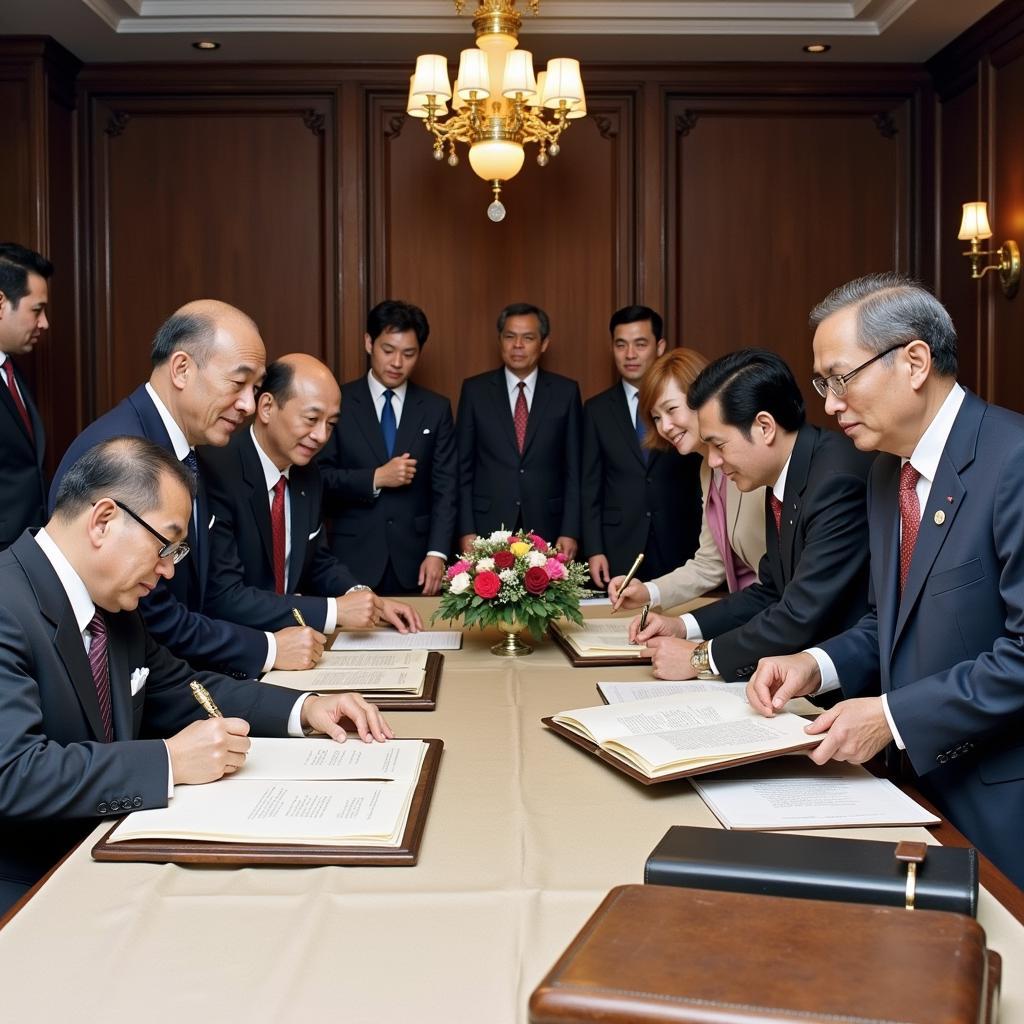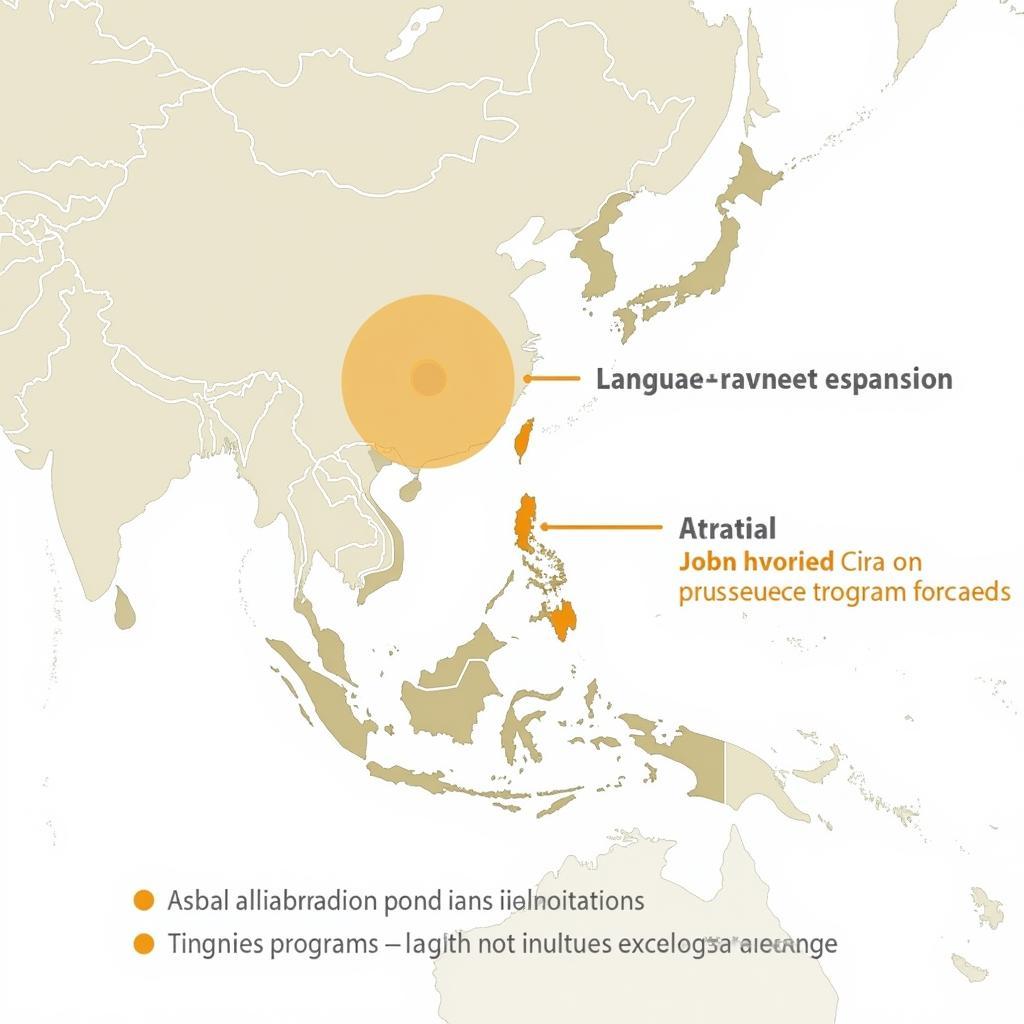The term “Asean 6 Peers” refers to the six founding members of the Association of Southeast Asian Nations (ASEAN): Brunei, Indonesia, Malaysia, the Philippines, Singapore, and Thailand. These nations laid the foundation for what has become a dynamic and influential regional bloc, shaping Southeast Asia’s economic and geopolitical landscape.
The Birth of ASEAN and the Role of the 6 Peers
 Founding Fathers of ASEAN Signing the Bangkok Declaration
Founding Fathers of ASEAN Signing the Bangkok Declaration
In 1967, amidst the Cold War tensions and regional instability, the foreign ministers of the six founding nations convened in Bangkok, Thailand. They signed the Bangkok Declaration, marking the official establishment of ASEAN. This pivotal document outlined the shared vision of these nations: to foster peace, cooperation, and economic growth in Southeast Asia.
Economic Powerhouse: The ASEAN 6’s Contribution
The ASEAN 6 peers have been the driving force behind ASEAN’s economic rise. Together, they account for a significant portion of the bloc’s GDP and trade. Their combined economic strength has not only transformed their own nations but has also positioned ASEAN as a major player in the global economy.
Here’s a closer look at the economic contributions of the ASEAN 6 peers:
- Trade: The ASEAN 6 have established a free trade area (AFTA) amongst themselves, promoting intra-regional trade and attracting foreign direct investment.
- Investment: These nations have implemented policies to attract foreign investment, leading to significant infrastructure development and job creation.
- Tourism: The ASEAN 6 boasts diverse cultures, historical sites, and natural beauty, making tourism a significant contributor to their economies.
Navigating Challenges: The ASEAN 6 in a Changing World
The ASEAN 6 peers face a myriad of challenges in the 21st century, ranging from geopolitical tensions to economic disparities within the region. However, their shared history and commitment to ASEAN principles guide their approach to these issues.
Some of the key challenges faced by the ASEAN 6 peers include:
- Maintaining Regional Stability: The ASEAN 6 plays a crucial role in ensuring peace and security in Southeast Asia, particularly in the face of maritime disputes and the rise of non-traditional security threats like terrorism.
- Bridging the Development Gap: While the ASEAN 6 has achieved significant economic growth, disparities persist within the region. Addressing these gaps is essential for inclusive and sustainable development.
- Promoting ASEAN Integration: The ASEAN 6 continues to champion further integration within the bloc, aiming to deepen economic ties, enhance connectivity, and strengthen ASEAN’s global standing.
The Future of ASEAN: The Enduring Legacy of the 6 Peers
The ASEAN 6 peers have played a pivotal role in shaping ASEAN’s trajectory over the past five decades. Their commitment to dialogue, cooperation, and regional stability has laid a strong foundation for the bloc’s future. As ASEAN continues to evolve and navigate a complex world, the legacy of the ASEAN 6 peers will undoubtedly continue to guide its path towards greater prosperity and integration.
FAQs about ASEAN 6 Peers
-
What is the significance of the Bangkok Declaration?
- The Bangkok Declaration marked the official formation of ASEAN in 1967, outlining the shared goals and principles of the founding members.
-
Why is intra-ASEAN trade important?
- ASEA and ASD Kids Intra-ASEAN trade strengthens economic ties, reduces reliance on external markets, and promotes regional integration.
-
How do the ASEAN 6 peers address regional disputes?
- The ASEAN 6 emphasizes dialogue, consensus-building, and adherence to international law to peacefully resolve regional disputes.
-
What is the role of ASEAN in the global arena?
- ASEAN, with the ASEAN 6 at its core, plays an increasingly important role in global affairs, promoting regional stability, economic cooperation, and multilateralism.
-
What are the future prospects for ASEAN?
- ASEAN is poised for continued growth and integration, driven by its young population, expanding middle class, and commitment to innovation.
Need more information about ASEAN or the ASEAN 6 peers? Contact us!
Phone Number: 0369020373
Email: [email protected]
Address: Thon Ngoc Lien, Hiep Hoa, Bac Giang, Vietnam.
Our dedicated customer support team is available 24/7 to assist you.


